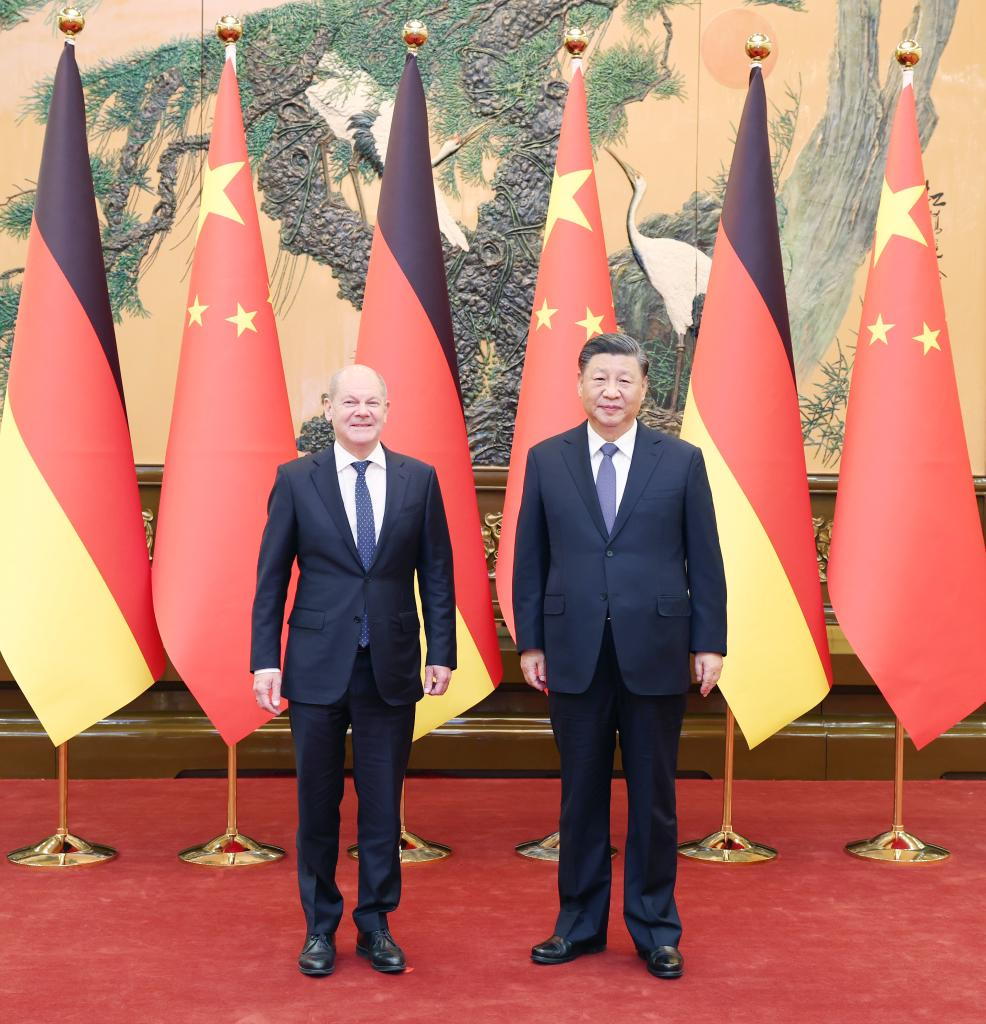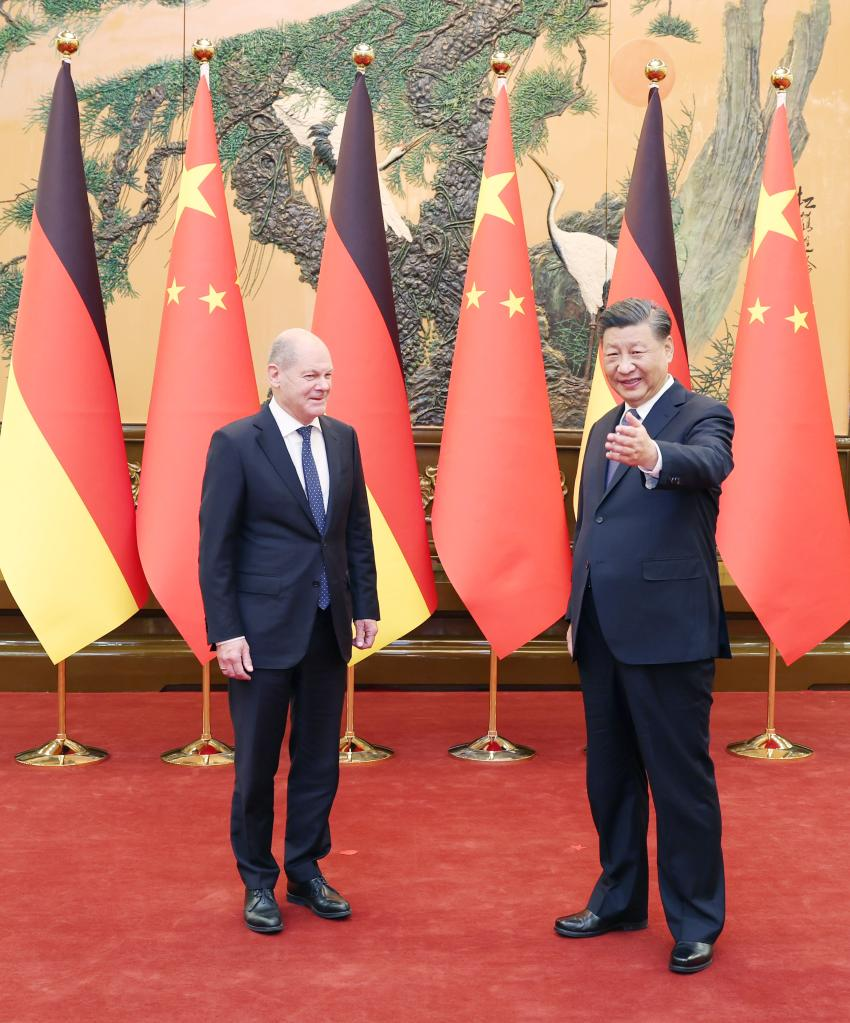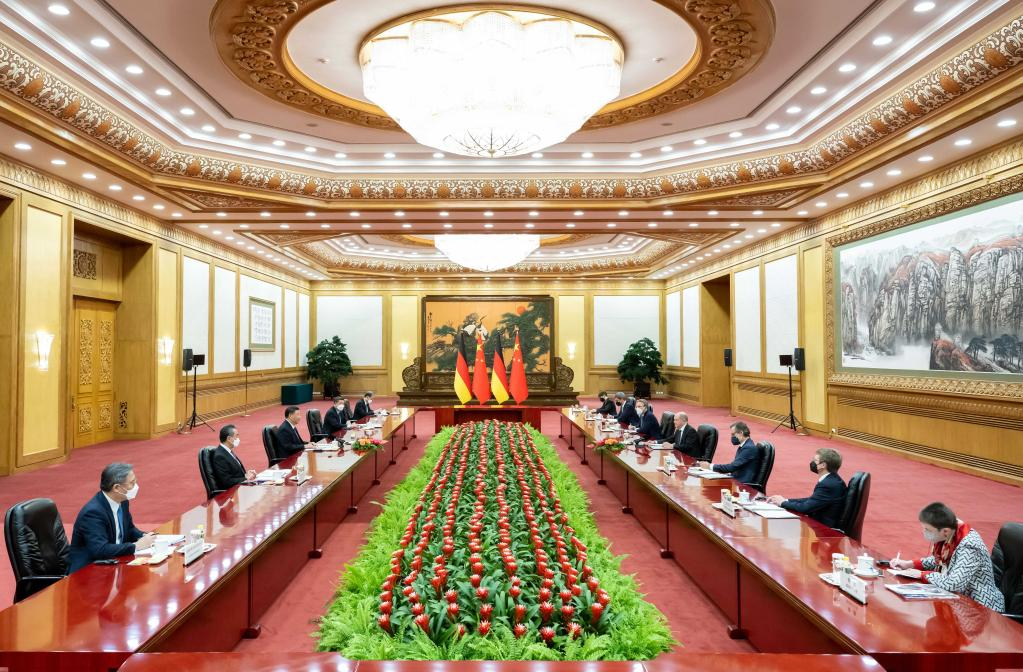Xi-Scholz meeting injects new momentum into China-Germany, China-EU ties, enhancing political trust

Chinese President Xi Jinping meets with German Chancellor Olaf Scholz on his official visit to China at the Great Hall of the People in Beijing, capital of China, Nov 4, 2022. Photo:Xinhua
Chinese President Xi Jinping met with German Chancellor Olaf Scholz on his official visit to China in Beijing on Friday, making him the first European leader to visit China after the 20th National Congress of the Communist Party of China. The two leaders agreed on enhancing cooperation and maintaining dialogue, rejecting decoupling and bloc confrontation, vowing to further expand cooperation beyond traditional areas into new sectors such as new energy and digitalization and increasing mutual political trust for a stable China-Germany relationship.
Scholz's visit - a short but fruitful one with great significance - is widely believed to inject new momentum not only into China-Germany ties but also overall China-Europe relations, setting an example for other European countries to balance their China policies, as finding a way to coexist with China also serves as touchstone for European strategic autonomy, experts said.
It also sends a clear message to the world that globalization is an irreversible trend as the US ramps up efforts to gang up for forming anti-China small cliques and forge a certain political correctness within Europe of defining China as a rival, and Scholz's visit will encourage and inspire more Western countries' leaders to increase communication with China, experts noted.
During the meeting, Xi underscored the need for China and Germany, two major countries with great influence, to work together in times of change and instability and contribute more to world peace and development. China will work with Germany for a future-oriented all-round strategic partnership and for new progress in China-Germany and China-Europe relations, Xi said.
Xi stressed that political trust is easy to destroy but difficult to rebuild and that it should be nurtured and protected by both sides. Noting the high degree of stability and consistency in China's policy toward Germany, Xi called on Germany to follow a positive China policy for the mutual benefit of both countries.
When it comes to China-Europe relations, Xi said China always regards Europe as a comprehensive strategic partner and supports the strategic autonomy of the EU, wishing Europe stability and prosperity. China maintains that its relations with Europe are not targeted at, dependent on, or subject to a third party.
A longer-than-scheduled meeting between the two leaders conveys special significance, as officials and observers believe that it's imperative that both sides have the chance to meet face-to-face amid the COVID pandemic and have frank discussions about bilateral relations. The consensuses reached on globalization, trade liberalization and a multi-polar world also indicated the future direction for China-Germany relations, China-EU ties and global affairs.

Chinese President Xi Jinping meets with German Chancellor Olaf Scholz on his official visit to China at the Great Hall of the People in Beijing, capital of China, Nov 4, 2022. Photo:Xinhua
Special significance
Scholz's visit reportedly with a high-level business delegation including carmakers Mercedes-Benz and Volkswagen, and chemicals giant BASF also shows how highly intertwined China-Germany business cooperation is.
During the meeting with Xi, Scholz said China is an important trading partner for Germany and for Europe as a whole. Germany firmly supports trade liberalization, supports economic globalization, and opposes decoupling, and it stands ready for closer trade and economic cooperation with China, and supports more mutual investment between Chinese and German businesses, he noted.
"A multi-polar world is needed in which the role and influence of emerging countries can be taken seriously. Germany opposes bloc confrontation, for which politicians should be held responsible. Germany will play its role in furthering Europe-China relations," Scholz said.
As the US advances its so-called decoupling from China and drives bloc confrontation, the two leaders expressed clear opposition to it, which sends an important signal for world stability and sustainable development, Jiang Feng, a research fellow at the Shanghai International Studies University, told the Global Times on Friday.
"After full consideration, just as the US has been ramping up efforts to create a climate for a certain degree of political correctness in Europe, Germany came up with this rejection of decoupling, which should be a consensus shaped among different political forces in the country," Jiang said.
Some Western officials and German politicians have been "warily" watching Scholz's visit, and some US media pointed out that Scholz is "under pressure from Washington, which wants Germany to get out of China," the NPR said.
German Foreign Minister Annalena Baerbock said on Thursday during an ongoing G7 foreign ministers meeting in Muenster in Germany that the G7 is ready to recognize China as a "competitor" and "rival" as Japan prepares to take over the presidency of the group of nations, according to media reports. Baerbock's Green party usually adopts harsh rhetoric on China and human rights topics.
Germany's national interests are now at risk of being taken hostage by certain political parties and individual interests, as it has been abnormal in former presidencies for foreign policy departments to speak with a different voice from the head of government, Cui Hongjian, director of the Department of European Studies at the China Institute of International Studies, told the Global Times on Friday.
"Germany needs a period of time for self-adjusting. As Chancellor, Scholz has the final say and if his ideas get a positive response from the Chinese side, then China-Germany is moving in the correct direction, which will enhance its policymaking inside the government," Cui said.
Also, Chinese experts believe that there will be a "ripple effect" in Europe following Scholz's visit, as a stable and developing China-Germany relationship will play a positive role in overall China-EU relations.
French President Emmanuel Macron had suggested to Scholz that they go to Beijing together and send a signal of EU unity, Reuters said. Zhao Lijian, spokesperson of the Chinese Foreign Ministry, said he had no available information to share when asked about the matter on Friday.
"Now the EU is at the point of adjusting their China policies. Which direction will they adjust to? It depends on how much the effects of China-Germany cooperation can expand to other countries and accelerate cooperation at the China-EU level," Cui said.
Xi and Scholz also talked about the Ukraine crisis during the meeting, and Xi reaffirmed China's support for Germany and Europe to play an important role in facilitating peace talks and to build a balanced, effective and sustainable security architecture in Europe.
Under the current circumstances, the international community should support all efforts conducive to the peaceful settlement of the Ukraine crisis and call on relevant parties to remain rational and exercise restraint, start direct engagement as quickly as possible, and create conditions for the resumption of talks, Xi said.
Xi said it should oppose the threat or use of nuclear weapons, advocate that nuclear weapons cannot be used and that nuclear wars must not be fought, and prevent a nuclear crisis in Eurasia.

Chinese President Xi Jinping meets with German Chancellor Olaf Scholz on his official visit to China at the Great Hall of the People in Beijing, capital of China, Nov 4, 2022. Photo:Xinhua
Practical cooperation
President of the EU Chamber of Commerce in China Joerg Wuttke told the Global Times in a written statement on Friday that the Chamber believes Germany should adopt a tailored approach and seek to deepen its engagement with China where interests overlap—such as in relation to fighting climate change, promoting international standardization and upholding the multilateral trading system—while also addressing areas where critical dependencies lie.
"Scholz's visit will set an example to other European countries," Wang Yiwei, director of the Institute of International Affairs at the Renmin University of China, told the Global Times on Friday. Amid the Ukraine crisis, Germany is not only important economically in Europe but also in security, Wang noted. "It's important to have practical cooperation and find new complimentarity, given the rising energy prices and production costs. Europe will face bigger trouble if it gives up cooperating with China," he said.
On Friday, Chinese Premier Li Keqiang also met with Scholz and described economic and trade cooperation as a ballast for the development of bilateral relations.
China is willing to strengthen cooperation with Germany in trade and investment, manufacturing, vaccines and other major fields, push for the creation of a collaborative mechanism for handling climate change and increase direct flights between the two countries to facilitate people-to-people exchanges, Li said, according to Chinese state broadcaster CCTV.
Over the past five decades, bilateral practical cooperation between the two countries has continued to deepen, with two-way trade growing by almost 1,000 times, serving economic and social development in both countries.
Xi told Scholz that the two sides should make the pie of common interests still bigger. While exploring more cooperation potential in traditional areas, efforts should be made to energize cooperation in emerging fields such as new energy, artificial intelligence and digitalization.
China is an important partner to Germany, as its future development is predictable, no matter how divided Germany is on ideology or recognition of our system, Jiang noted. "They clearly see the stability, continuity and sustainability of China's development, as they know they can't get rid of China's role in economic growth, climate change and other global issues."
However, Chinese experts believe that the US will continue exerting influence on Europe. For example, it recently pointed the finger at a Chinese company for taking a controlling stake in Germany's Hamburg port terminal.
"Europe's China policy will be a touchstone for its strategic autonomy," Jiang said, as how to define its China policy in order to reflect the continent's real interests still remains a challenge.


